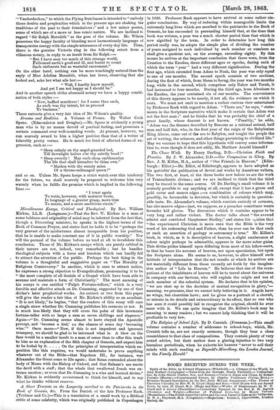The Closer Walk. By Henry Darling, D.D.—Christian Faith and Practice.
By J. W. Alexander, D.D.—Our Companions in Glory. By Rev. J. M. Killen, M.A., author of" Our Friends in Heaven." (Edin- burgh: Elliot.)—Mr. Elliot, of Edinburgh, appears to have adopted as his spec-Wire the publication of devoti.,nal works by American writers, The two first, at least, of the three books now before us are the work of Transatlantic divines ; and we are inclined to think that the third may be traced to the same source. Of Dr. Darling's small volume it is scarcely possible to say anything at all, except that it has a green and gold cover and mauve edges ;—a combination of colours which may, possibly, be favourable to devotion, but which is certainly in question- able taste. Dr. Alexander's volume, which consists entirely of sermons, has also mauve edges—just, we suppose, as a preacher sometimes wears lavender kid gloves. The discourses which it contains appear to be very long and rather violent. The doctor talks about "the avowed atheist and convicted blasphemer Shelley," and states his :yinion that "the experienced Christian is more sure that the Bible is the very word of his redeeming God and Father, than he ever can be that such or such an assertion of geology or astronomy is true." Mr. Killen's book, in which, as it is descriptive of heaven, a slight exuberance of colour might perhaps be admissible, appears in far more sober guise. This divine prides himself upon differing from most of his fellow-seers, in that he bases his account of heaven, not upon speculation, but upon the Scripture alone. He seems to us, however, to allow himself such latitude of interpretation that the net results at which he arrives are not materially different from those recently set forth by the imagina- tive author of "Life in Heaven." He believes that one of the occu- pations of the inhabitants of heaven will be to travel about the universe in company with our Saviour, who will explain the origin and use of each member of the celestial system. He declares that in his opinion, "we are shut up to the doctrine of mutual recognition in glory,"— meaning, we presume, that we cannot help believing in it. Angels have no wings, but cherubim have ; and he gives us a portrait of a cherub, so minute in its details and extraordinary in its effect, that no one who has seen it could possibly fail to recognize the original, should he ever meet with it. We can quite imagine that Mr. Killen's book may be amusing to many readers ; but we cannot help thinking that it will be profitable to very few.






























 Previous page
Previous page